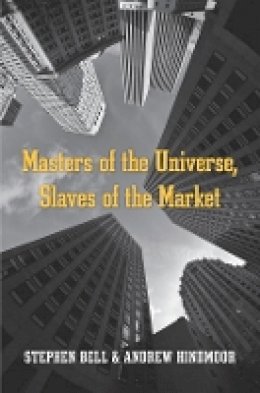
Masters of the Universe, Slaves of the Market
Stephen Bell
This account of the financial crisis of 2008–2009 compares banking systems in the United States and the United Kingdom to those of Canada and Australia and explains why the system imploded in the former but not the latter. Central to this analysis are differences in bankers’ beliefs and incentives in different banking markets.
A boom mentality and fear of being left behind by competitors drove many U.S. and British bank executives to take extraordinary risks in creating new financial products. Intense market competition, poorly understood trading instruments, and escalating system complexity both drove and misled bankers. Formerly illiquid assets such as mortgages and other forms of debt were repackaged into complex securities, including collateralized debt obligations (CDOs). These were then traded on an industrial scale, and in 2007 and 2008, when their value collapsed, economic activity fell into a deep freeze. The financial crisis threatened not just investment banks and their insurers but also individual homeowners and workers at every level. In contrast, because banks in Canada and Australia could make good profits through traditional lending practices, they did not confront the same pressures to reinvent themselves as did banks in the United States and the United Kingdom, thus allowing them to avoid the fate of their overseas counterparts.
Stephen Bell and Andrew Hindmoor argue that trading and systemic risk in the banking system need to be reined in. However, prospects for this are not promising given the commitment of governments in the crisis-hit economies to protect the “international competitiveness” of the London and New York financial markets.
Product Details
About Stephen Bell
Reviews for Masters of the Universe, Slaves of the Market
J. Prager
Choice
An extraordinarily good book that combines a superb command of the material, with real and vivid detail, and a very clear and thoughtful conceptual apparatus, lightly delivered.
Tony Payne, University of Sheffield This book is a welcome contribution. On the theory side, I especially like the way it sets up the interaction among structure, institutional context, and agency. I also admire the two dimensions of comparison: within country among banks in the United Kingdom and the United States, and across countries, with the cases of Canada and Australia providing important comparative leverage to the project. This will add to a renaissance of attention in political science to the question of how business exercises influence in and over politics.
Pepper D. Culpepper, European University Institute, Florence An outstanding book. I am sure it will not only make a considerable immediate impact but will be a standard account of the crash and its aftermath for years to come.
Michael Moran, University of Manchester For those interested in understanding the [global financial] crisis in general and from an academic standpoint there is much to enjoy in this excellent book. By setting up a rigorously formed picture of how bankers thought, why they did and in which context they acted, the authors are able to offer an account of the crisis which is able to stand out from the plethora of existing literature.
Nicholas Thomason
LSE Review of Books
